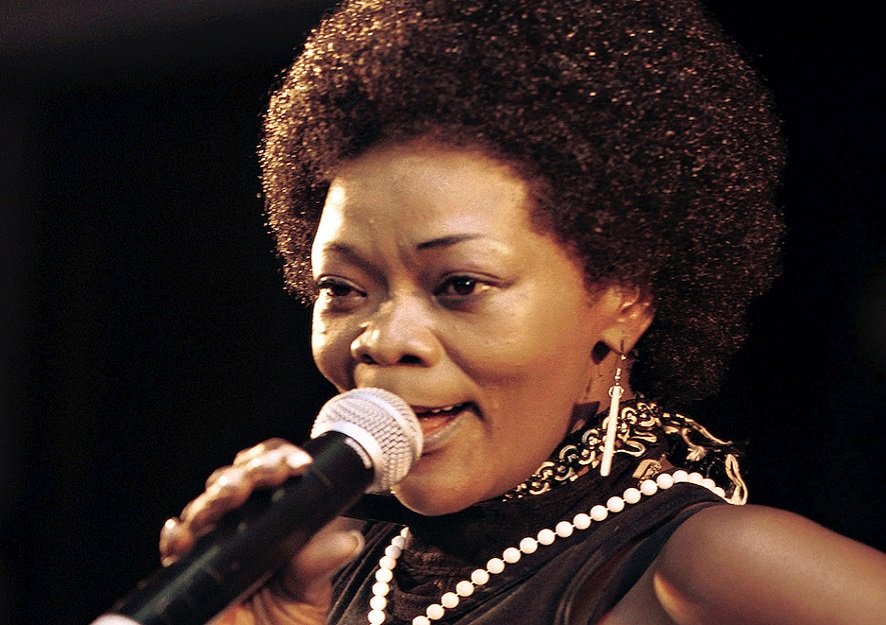“Out of a thousand people you talk to in Africa, maybe two would say they don’t know Brenda,” producer and musician Sello Twalla is reported to have said one time about the woman he knew very well.
Brenda Fassie was a few months shy of 40 when she died on May 9, 2004. The South African singer’s life was cut short by respiratory and cardiothoracic challenges. Post-mortem examinations also showed Fassie had overdosed on cocaine prior to falling into a coma from which she would never recover.
It was also reported that she had contracted HIV/AIDS.
Tragic end as it may be, Fassie was a pop star in every sense of the modern conception, trading in the good, the bad and the outrageous. She was loud and she was vocal, if you can believe those two words mean two different things.
Brenda Fassie South Africa
And for someone of her calibre, being openly gay in Africa, despite all the violent opposition, was part of the thrill. She dared all; they had to accept her for who she was.
“I am a shocker. I like to create controversy. It’s my trademark,” Fassie said.
So when she referred to herself as a lesbian, it would have been easy to write her off as an attention seeker. She had, after all, had a baby with a man at 20 and was rumoured to be the lover of other men.
But Fassie was defiant and proud of her relationship with women. For her, the rebellion itself was the point.
Prior to South Africa legalising same-sex marriage in 2006, there was little to no protection from authorities for queer individuals. Legal precedents to 2006 were established in 1996, yet granting equal rights to queer folks was unpopular.
In the late 90s and early 2000s, it was common to read of hate crimes aimed at LGBT people in South Africa.
As recent as 2010, a UN report would state of the Rainbow Nation: “In South Africa, a large-scale march in Soweto brought attention to the widespread rape of lesbians in the townships, which perpetrators often try to justify as an attempt to “correct” the victims’ sexuality.”
This was very much Fassie’s world but she remained unapologetically herself. She was also quite hopeful that one day she would be allowed to legally settle with her girlfriend, Gloria Chaka.
She said in an interview, “We’ll get married. When we decide, we will. As a South African music icon, I think I should have my rights given to me.”
The pop star knew she was not like any other gay South African. She was an award-winning musician with a larger than life personality and a global audience.
But as much as that self-image fuelled pride in her, Fassie was also aware of her place in the greater scheme of things; a queer woman in South Africa, even if rich and famous.
Fassie, however, refused to be “that gay singer”. It would be too pathetic to be entirely defined by what you do behind closed doors with other consenting adults.
In that case, she had to be better than usual. With due respect to female contemporaries such as Vicky Sampson, Yvonne Chaka Chaka and Margaret Singana, Fassie’s was not just misogyny to overcome but homophobia too.
The hurdle was double, the task, metaphorically twice her size. To a very good extent, Fassie braced the storm until she couldn’t anymore.
And if she were not winning awards or feuding with journalists, Fassie was championing the cause of poor folks. Time Magazine thought she did so good a job they called her “Madonna of the Townships“.
Brenda Fassie life story
For the Western observer, the similarity was tempting; aside from the fact that they both knew how to cause controversy, Madonna owns hypersexual performances and songs and Fassie made confident references to her taboo preferences.
But for an African observer, Fassie was first of her name. Never before and after she has an African artiste owned his or her queerness in public.
Fassie was dynamite and one would argue she helped to change a few minds. We are still a long way from the world, Fassie would have wished for.
For instance, if she were alive, South Africa is the only country in Africa in which Fassie could be married, although she is free to be herself in a few others.
Whether you are nodding to continental hit Vuli Ndlela or analysing the difficulties Africans have to face overcoming homophobia; or even if you are not afraid to cause good trouble on behalf of the underprivileged and you stand up against anti-black discrimination, it would be great to acknowledge the contributions of the tragic heroine, Fassie.










